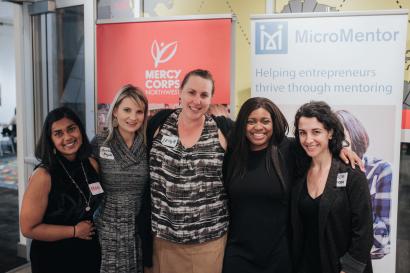Who we are

We are Mercy Corps – a global organization fighting the world’s toughest problems. We put bold ideas into action to transform lives and create lasting change. We believe that communities around the globe can develop entrepreneurial solutions to any problem, no matter how intractable, when connected with the right resources.
At Mercy Corps Northwest we embody this mission for 25 years by working together to build just, productive and resilient communities across the Pacific Northwest. Our mission existed to invest in communities, uncover breakthrough solutions, and fight for equitable opportunities across the Pacific Northwest. We know that when we invest in potential – individuals and families are given the ability to thrive, and not just survive.
History
Mercy Corps Northwest programming began in 1998 with a goal to reduce unemployment, grow personal incomes and assets, and increase economic growth. After 25 years offering programs in Portland, Seattle, Southwest Washington and Walla Walla – Mercy Corps Northwest transitioned its programs to the community in January 2024.
Our programs
- Empowered 2,100 small business owners each year with funding, education and mentorship.
- Supported women-owned businesses at the Oregon Women’s Business Center, sponsored by the U.S. Small Business Administration.
- Reduced the rate that incarcerated women commit repeat offenses by 50% with prison reentry support.
- Improved services at more than 30 local nonprofits that work to alleviate poverty by placing AmeriCorps VISTA members.
- Supported underserved communities and small business owners with disaster preparedness knowledge.
Who we serve
Mercy Corps Northwest served low-income citizens of Oregon and Washington to create more productive, secure and satisfying lives for themselves, their families and their communities. Our programs supported them in increasing their economic self-sufficiency and community integration by providing resources and support in their efforts to improve their lives.
Client demographics
- Our clients across programs were 70% women and 30% men. In our small business programs, 63% of clients identified as women
- 80% of our clients represented underserved communities within our region including people of color, immigrants or migrants, women or gender non-binary, and non-English speakers
- 1 in 3 of our clients identified a person of color including Black, Indigenous, Hispanic and Latinx, Asian, and other historically marginalized groups
- The majority of MCNW clients lived at, or slightly above, the federal poverty line and below 80% of Median Family Income (MFI). Rarely did our clients’ incomes exceed 200% of the prevailing U.S. government poverty rate.